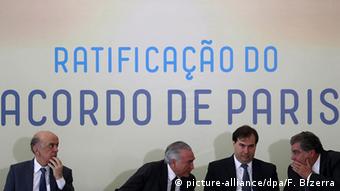South America
Brazil and Panama to ratify the climate Treaty
They are the countries number 27 and 28, to accept the Paris climate agreement. Half the job is done until the end of the year, the Treaty could enter formally into force. The words must follow deeds.

Via Sao Paolo in southeastern Brazil, a dark pall of haze hangs
As Michel Temer, last month, the
Brazilian presidency, Dilma Rousseff took over, he promised that with the new government, nothing changes on the support for the Paris climate agreement. Now Temer has signed the contract, after both houses of Congress had agreed. “Climate change is the responsibility of the state. It is for all governments have an obligation,” said President Temer at the signing in the capital, Brasilia.

The President of Brazil, Michel Temer (second from left) at the ceremony in Brasilia
That Brazil is committed to climate protection, is significant, the country is the largest air polluter in South America. According to United Nations data, Brazil’s share in the global emissions of carbon dioxide (CO2) and other greenhouse gas emissions of 2.5 per cent. Thus, the state of the global is on place seven.
Half the job is done
The Paris climate agreement will enter into force once 55 countries responsible for at least 55 percent of global emissions, to approve the agreement formally, therefore, ratify it. Experts say it could be until the end of the year. The climate agreement had to get the beginning of the month a boost, as
US President Barack Obama and China’s President Xi Jinping, the Treaty had been ratified.
In order to reduce the emission of greenhouse gases, the States own goals. These are not legally binding, but must be every five years updated. Compared to the values in 2005, Brazil wants to reduce the CO2-emissions by 2025, 37 percent in 2030 to 43 percent. The Central American Panama wants to win 70 percent of its consumed energy by 2050 from renewable energy sources.
In the Paris agreement establishes that the temperature increase compared to pre-industrial times to two degrees Celsius, as far as possible, should be restricted. The agreement was signed at the
UN climate change conference in December 2015 in Paris decided.
ust/wa (rtr, afp, ap)